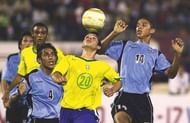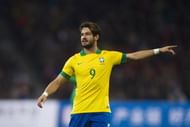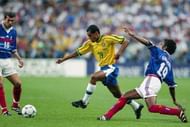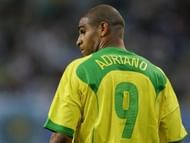Football is a sport that regularly churns out young superstars who are tipped for greatness. Increased global media coverage and attention mean that most of these players are thrust into the limelight earlier than they can handle it, leading to most of them derailing.
When it comes to production lines for talented young footballers, there is probably none bigger than Brazil, with the country's fanatical followership of football turning it nearly into a religion in the South American nation.
Almost every young boy in Brazil dreams of becoming a professional footballer and wearing the mythical yellow and blue of the Samba Boys and have a plethora of historical Brazilian legends to look up to.
Most Brazilian footballers hone their developmental skills on the streets of Brazil where the focus is on technique and not tactical nous, hence the skilful nature of the average Brazilian player.
History is littered with an abundance of young players who showed early promise but faded away after their bright start and Brazil has given us its own fair share of talented youngsters who didn't live up to their billing. I list the top 5 Brazilian wonder kids who didn't fulfil their potential.
Honourable mentions: Paulo Henrique Ganso, Lulinha, Anderson, Keirrison, Evandro Ronatto
#5 Robinho

With 100 caps (6th highest) for the Seleção and 12 senior titles won, it is understandable to wonder what the 34-year-old attacker is doing on the list, but the truth is that a lot more was expected from Robinho and he largely failed to deliver. He was picked by Pele to be his successor in 1999 at the tender age of 15 and three years later aided Santos in winning it's first Campeonato Brasileiro since Pele himself won it in the 1970s.
He was courted by a number of top European clubs but eventually agreed to join Real Madrid in 2005. He spent three seasons at the Bernabeu and was instrumental in their league triumphs of 2007 and 2008 but after the club failed to offer him a new contract in the hope of using him as a lightweight to get Ronaldo to Madrid in 2008, Robinho asked to leave the club.
He arrived at Manchester City as their first marquee signing for a then Premier League record of £32.5 m on the same day that the club was taken over by the Abu Dhabi United group. Robinho failed to impress significantly at the club and just a season later was sent on loan back to former club Santos as he had fallen down the pecking order at City and sought playing time to retain his place in Brazil's squad for the 2010 World Cup. Since that time, Robinho has become something of a journeyman turning out for AC Milan, Santos, Guangzhou Evergrande, Atletico Mineiro and now the Turkish Super Lig with Sivasspor.
Robinho never stayed in one club long enough to earn legendary status there and though he will retire with his career considered relatively successful by many, for all the early promise shown by Robinho, he failed to live up to expectations.
#4 Kerlon

Kerlon came into prominence on the back of his eye-catching performances at the U17 South American and World championships of 2005, with his unique way of dribbling past players by flicking the ball onto his head and running towards the opposition goal leading to numerous fouls on him and Diego Rocha Coelho earning a five-match ban for hitting him with an elbow..
YouTube helped propagate his popularity as the video-sharing website was still in its early years and millions from around the world trooped online to watch Kerson perform the 'drible la foquinha' (seal dribble).

Kerlon's transfer to Europe came in 2008, after signing for Genoa on loan from Inter as an affiliate by using Genoa's non-EU quota. Injuries became unkind to Kerlon, particularly a recurrent knee injury and he spent the next nine years playing for seven clubs in diverse countries like Japan, Malta, and the USA.
Kerlon's last club was Spartak Trnava in Slovakia and after his contract got terminated in 2017, Kerlon announced his retirement from football at the very young age of 30. A rather sad end about what injuries did to a story whose beginning had so much promise.
#3 Alexandre Pato

In a team which also had future world class players Marcelo, David Luiz and Willian, Alexandre Pato was undoubtedly the star of the Brazil squad that participated at the FIFA U-20 World Cup hosted by Canada in 2007.
Though the team failed to deliver, having their tournament ended by Spain in the second round, Pato left the tournament with his reputation enhanced as his three goals showed the world his adequate capabilities in front of goal.
He had attracted world attention a year earlier, when at the age of 17 years 102 days, he broke Pele's long-standing record of being the youngest player to score in a FIFA organized competition with his goal against Al Ahly at the 2006 FIFA World Club Cup. Pele was 17 years 209 days when he scored against Wales in the 1958 World Cup. Pato turned out impressively, helping his club Internacional defeat Barcelona and lift its first World Club Cup in 2006.
A considerable number of clubs were interested in Pato's signature, but the then 17-year old chose to sign for Italian giants and incumbent European Champions AC Milan in 2007. His first season at Milan went well as he scored on his debut and ended the season with 9 goals from 20 appearances. He was impressive enough to be voted the Best young player in Serie A and win the prestigious Golden Boy award (given to the adjudged best player in the world under the age of 21 in a given year) in 2009.
After some good performances in the early part of his Milan career, Pato became an injury prone player which cost him a place in the Milan first team as the club itself began its downward slide.
Pato returned to Brazil in 2013, signing with Corinthians for a fee of €15m but still failed to reignite his spark and underwent two further loans to Sao Paulo and Chelsea, both of which were underwhelming, making just two league appearances for Chelsea.
He was transferred to Villareal in August 2016, but just five months later, he signed for Chinese Super League side Tianjin Quandian and cost them a maiden Chinese Super League title when he missed an 88th-minute penalty in the title-deciding match.
At the international level, Pato fared worse, making just 27 appearances for the Brazil national team scoring 10 goals and hasn't represented the Samba Boys since 2013.
#2 Denilson

A lot of eyebrows were raised in 1998 when Spanish club Real Betis paid a world record fee of £21.5m to sign a 20-year-old Denilson from Sao Paulo. The talented winger scored just two goals in 35 appearances for Betis in his first season, before the club got relegated to the Segunda just two seasons after he arrived.
This marked the beginning of the downward spiral of Denilson's career. He transferred to Brazil on loan but returned to Betis in January 2001 to aid in their successful promotion back to the top-flight.
Just three seasons after his world record move, Denilson found himself on the fringes of the Betis team and started just three matches in the 2004/2005 season as Betis qualified for the Champions League and won the Copa Del Rey.
He was sold to Ligue 1 side Bordeaux in August 2005, with four years left on his Real Betis contract and left the French League for Saudi Arabia; which begun his journeyman status, as he played in five clubs in five different countries including Vietnam and Macedonia before announcing his retirement in 2010.
On the International scene, Denilson was more accomplished, winning 61 caps between 1996 and 2003 and was part of the victorious squads in the 1997 Copa America and FIFA Confederations Cup, winning the Golden Ball at the latter tournament. He also represented his country at two World Cups in 1998 and 2002, winning the 2002 edition.
A supremely excellent dribbler, Denilson was a master in the art of performing the feint dribble and showed a lot of promise with his pace in his early career. However his world record move in 1998 put an enormous pressure on his shoulder and even though he had a brilliant career with Brazil, his patchy club performances meant the Sao Paulo native did not live up to the lofty expectations of him.
#1 Adriano

Adriano courted world attention at the start of the millennium after breaking into the Flamengo first team at the tender age of 16 years, and at 19, he started his European sojourn with a transfer to Inter Milan in 2002.
Strong, quick, good in the air, an excellent dribbler with close control and possessing a thunderous left foot, Adriano was considered the 'new Ronaldo' and was expected to hold down the Brazilian striking spot for at least a decade.
After a bright start to his Inter Milan career where he scored 42 goals from 2004 to 2005, it all went downhill for Adriano after receiving a phone call telling him that his father had passed on in Brazil.
Former Inter captain and Adriano's teammate Javier Zanetti described the incident saying he saw him cry after the phone call as his father was an inspirational figure in his life and that though Adriano continued to score goals and dedicate them to his father, the Rio de Janeiro native was suffering from emotional trauma.
The drinking started as Adriano sought to drown his sorrows in alcohol. He stopped maintaining his fitness and repeatedly turned up at training drunk. His work ethic also came into question as he was making more impact in nightclubs than on the field of play.
Inter Milan began to lose patience with the Brazilian and sent him on a number of loan spells back to Brazil. He was officially transferred to Flamengo in 2009, the club where he started his professional career and he performed decently well enough to help Flamengo win its first Brazilian Serie A title since 1992.
He returned to the Italian Serie A to play for Roma in 2010 but had his contract terminated after just seven months. He signed for Corinthians in March 2011 but was released just a year later due to his inconsistency and disinterested body language.
On the international scene, Adriano formed a fearsome partnership with Ronaldo de Lima and was widely tipped to replace Ronaldo as Brazil's next great striker. He made 48 appearances for Brazil, scoring an impressive 27 goals. He won the Copa America with Brazil in 2004, scoring a dramatic late equalizer against Argentina in the final and was the Golden Boot winner in the tournament. A year later, Adriano was also the Golden Boot and Golden Ball winner, scoring two goals in 4-1 final victory over Argentina as Brazil triumphed in the 2005 FIFA Confederations Cup.
Earning the nickname L'Imperatore (the Emperor) in Italy, Adriano was seen as a combination of both Ronaldo and Ibrahimovic and was tipped to surpass both of them. At a young age, Adriano had the world at his feet, however, the death of his father, ill-discipline, fitness issues and alcoholism meant that the world was left wondering 'what if' and never able to see the best of Adriano.
